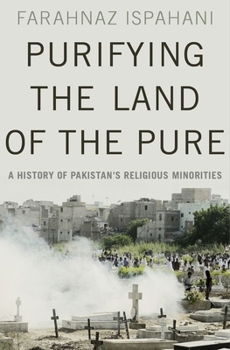Purifying the Land of the Pure: A History of Pakistan's Religious Minorities
Select Format
Select Condition 
Book Overview
When Pakistan emerged as an independent state in 1947, it sought to provide a new homeland and safe harbor for South Asia's Muslims, the largest religious minority in the subcontinent at the time. Yet this project was not exclusive. Taking its name from Pakstan, an acronym composed of the key letters of its constituent regions-Punjab, Afghania, Kashmir, Sindh, and Baluchistan-Pakistan at first welcomed all of its new citizens, Muslim and non-Muslim alike. Non-Muslims comprised 23 percent of the total population, and non-Sunnis comprised a quarter of the Muslim population. Today, non-Muslims comprise a mere 3 percent of the population, and in recent years all non-Sunnis have been subjected to increasing levels of persecution and violence. What happened? In Purifying the Land of the Pure, Farahnaz Ispahani analyzes Pakistan's policies towards its religious minority populations, beginning from the time of independence in 1947. She notes the period of transition from an inclusive policy to an exclusive one, citing the influence of a number of religious and political leaders who invoked a new vision for Pakistan. The word "pakistan" is Urdu for "Land of the Pure"; thus, in their view, it followed that the objective for Pakistan's creation should be more specific and narrow: to create an Islamic State. In 1949, Pakistan's Constituent Assembly ratified this objective, which set the country on the path it was to follow. But as Ispahani carefully notes, the event that accelerated the pace towards intolerance of non-Sunnis was General Zia-ul-Haq's forceful ascent to power in 1977. His military regime promoted Sunni Islam at the expense of other denominations so that by the end of his reign, Pakistan was no longer a welcome place for minorities. Many fled, but those who remained faced escalating persecution, from both state and non-state actors. Tens of thousands died in the ensuing "purifying" attacks. Ispahani traces this history, stressing how the contradictions at the heart of the Pakistani state-building project have fueled the intolerance. Concise yet sweeping in its coverage, Purifying the Land of the Pure is essential reading for anyone interested in understanding why Pakistan remains plagued by radicalism and violence.
Format:Hardcover
Language:English
ISBN:0190621656
ISBN13:9780190621650
Release Date:February 2017
Publisher:Oxford Univ PR
Length:224 Pages
Weight:1.04 lbs.
Dimensions:1.0" x 6.2" x 9.4"
Customer Reviews
0 rating





